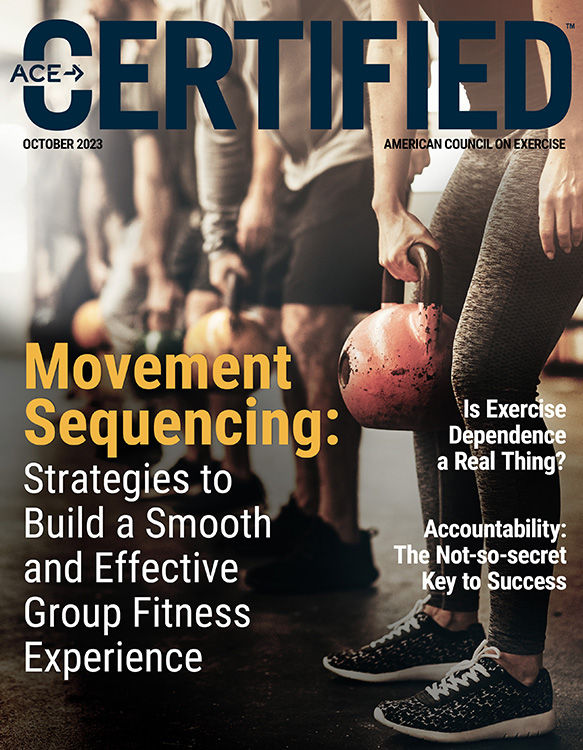
Think back to when you first started training.
Maybe you were a young person who hit the weights to build some self-confidence along with muscle. Maybe you were a high school athlete, whose performance on the field or the court depended on your fitness. Maybe you were simply a big fan of Arnold or Bev Francis, and loved the feeling of getting pumped up—or leaned out.
Either way, considering that it’s now your profession, chances are you adapted well to the regimen of exercise. You hit the weights hard, enjoyed the feeling of getting bigger, stronger, faster, fitter. You rarely missed a workout, and you probably never needed anyone to remind you about hitting the gym. You were already plenty self-motivated to do the hard work needed to achieve your fitness goals. You probably even looked forward to it.
Unfortunately, not everybody is like you.
These others—for whom training is something new, uncomfortable and maybe a little strange—need your help, and not only to plan out their workouts, supervise them and make sure they’re performing the movements properly in the gym. No, these folks also need help getting themselves to the gym. They may need support from you to ensure that they are consistent in their training, and in other aspects of their lives that can contribute to their health and well-being.
Yes, they’re depending on you to help them identify ways to ensure they stick with their programs and keep moving toward the goals they have set for themselves.
This is accountability. This word is widely used in everything from management seminars to self-help articles, and even though its meaning and application extend far beyond our industry, it’s at the heart of what you do as a health and exercise professional.
Accountability Defined
So, what does accountability mean?
The Merriam-Webster dictionary defines accountability as an obligation or willingness to accept responsibility or to account for one's actions. Management consultant Todd Herman describes it as “...being willing to answer…for the outcomes resulting from your choices, behaviors and actions.” And the website of software development firm Range asserts that accountability involves “showing up and setting out to accomplish the things you’d said you’d do. It’s about taking personal responsibility for your work.”
In the workplace, the general view is that managers must be both accountable and responsible. “They are held responsible for whatever their span of control is, whether it be a team, business unit, facility or process,” writes Gavin Brown of the Niagara Institute. “They are held accountable for whatever their goals are, whether it be revenue, customer satisfaction or productivity.”
And yet, in the fitness industry, there are differing opinions about who is responsible for helping clients embrace this fundamental attribute, particularly for those who are members of a gym or club.
Some feel that, if you’re a personal trainer or coach, that responsibility falls right on your well-trained shoulders.
“Personal trainers are the original accountability experts,” argues industry consultant Pete McCall, author of Smarter Recovery; A Practical Guide to Maximizing Training Results (Human Kinetics). If your client’s results are not matching their goals or expectations, they may need more guidance in setting up a system of accountability that works for their individual needs and circumstances.
But in some gyms, that view is being challenged. The feeling is that getting members to make the often-difficult lifestyle changes needed to improve health and fitness is a hard task—and it shouldn’t be left up to trainers alone.
When Evolution Barbell, a gym in Myerstown, Pa., decided to offer a six-week Fitness Challenge for members, owner Chad Hackman designated an accountability coach who would send participants weekly text messages and hold one-on-one meetings with them during their regular check-ins to record weight and body compositions. He chose a former high school teacher and gym member who had also earned a certificate in coaching. The availability of this new “accountability coach” proved to be quite popular with participants who joined the Challenge. “We got a lot of good feedback about that,” Hackman says. “I think sometimes people just need that buddy—someone they can talk to—to help them through the process of improving their health and fitness.”
Others believe that person should also be the trainer; and that neither a trainer nor a coach should have the word “accountability” added to their title.
“In my experience, every good coach or trainer is an accountability coach, which makes the term redundant,” says Julian Barnes, cofounder and CEO of Boutique Fitness Solutions. “How can anyone do that without providing accountability?”
Regardless of who is actually doing the accounting, a one-on-one coach can be invaluable in helping people reach their health and wellness goals, especially when those goals involve lifestyle changes that can help manage or even reverse certain diseases.
For example, a 2015 study, published in the medical journal BMC Family Practice, looked at how a coaching intervention at three primary care clinics in Canada could help patients with diabetes better adhere to their medication and make the diet- and exercise-related lifestyle changes needed to better manage their disease. “Diabetes is a condition that can really benefit from lifestyle changes, in addition to medication management,” says lead author Dr. Clare Liddy, MD, a professor of Family Medicine at the University of Ottawa. “The lifestyle changes, though, are very tough for many of us to navigate.”
Dr. Liddy and her co-investigators decided to test the effectiveness of one-on-one health coaching to support patients in their efforts to adhere to their medications, follow a healthy diet and get more active. “We were really interested in the acceptability by people of this kind of coaching intervention, and whether we would see any changes in outcomes, and we did!” says Dr. Liddy. The researchers observed increased accountability by those who utilized the coaching. It's worth noting that, according to Dr. Liddy, the one-on-one coaching was most appealing to male subjects, while women, given the option, seemed to gravitate toward group discussions.
The Communication Factor
Based on this and other research, it is clear that one-on-one coaching can be effective in helping people make healthy lifestyle changes. Now let’s go back to the gym setting and the trainer’s role in all this: How do you help your clients become more accountable for their own actions, particularly when you’re only seeing them a couple of times a week at most?
It starts with building a bond. “There needs to be a certain amount of trust fostered between trainer and client,” says Lawrence Indiviglia, a veteran trainer who coaches exercise professionals as part of Todd Durkin’s Mastermind Program. “In my view, that client will not be willing to be held accountable unless there’s that trust.”
Establishing trust—and thus, the expectation of accountability—revolves around what Indiviglia calls the “3 P’s” of success in this field. “The trainer needs to be prepared, professional [and] personal,” he says.
And you can add a “C” to that: They need to communicate.
Not just in the gym, where personal trainers are expected to be able to clearly describe the movements they’re asking their clients to perform. We’re talking about communication outside of the gym, beyond the workout session.
Accountability Asks
John Polemis of the New York University Coaching for Leadership program recommends using the following questions to help your clients assess their level of accountability and to identify the best way you can support their efforts:
- What will you do?
- When will you do it? (Looking at your schedule and your current commitments, when can you realistically devote the time you need to complete this?)
- Who can support you?
- What resources do you need to complete this successfully?
- How will you know you’re done?
- How would you like me to hold you accountable for your goals in a way that will sound supportive rather than negative?
- How do you want me to approach you if you don’t follow through with the commitments you make? What would be a good way to bring this up?
In the Ottawa study described earlier, the weekly personal consultations by health coaches with the patients with diabetes lasted between 30 and 60 minutes. As a trainer, you’re already devoting that same amount of time in your workout sessions with clients, but to ensure accountability, you might want to continue the conversation in other ways. “Maybe the client needs a weekly text message or phone call from you,” Indiviglia says. “Maybe just a check-in to see how they’re doing with their other workouts, with their eating and sleep.”
Some trainers might hesitate there: After all, time is money. You’re supposed to do this texting and phone-calling for free? “Look at it an opportunity to strengthen your business,” urges McCall. “You can even create an accountability package. Maybe you offer one or two sessions a week of regular one-on-one training, and a once-a-month coaching session, where you can review their overall workout regimen and progress.”
McCall also notes that there a number of online programs and apps available (such as Mindbody and ABC Trainerize) that enable you to automatically send regular messages to your clients. Utilize them to efficiently establish channels of communication outside the gym.
Paying attention to your client’s accountability means paying attention to your client. In every way. “The more a trainer or any kind of coach can put the focus on their client, the better,” says Raleigh Mayer, a New York City–based leadership coach and communication advisor. “It shouldn’t just be ‘five more reps,’ ‘keep your abs tight’ and ‘good workout, today.’”
That can start with something as simple as exploring and helping your clients structure an accountability system. This can be accomplished by asking your client such as “How would you like to be held accountable for that?” “How will you track your progress?” and “How can I help you to be accountable to yourself?” If the client and coach determine that check-ins would be a helpful and desired approach, ask more questions to find out how they would like to be contacted (Do they prefer text, phone, email?) and how frequently (Once a week? Every other week? Monthly?). This tells your client that you understand them and that you want to make the relationship as easy as possible for them, says Mayer.
Your check-ins don’t have to be complicated or involved. They can be as simple as asking:
- How did you feel after our most recent training session?
- Are you getting some activity on the days we’re not in the gym together?
- Any aches and pains I should know about?
- What’s your sleep been like?
In addition to these types of conversational inquiries, Mayer recommends developing some kind of tangible benchmarking—think of it like the height chart that marks the growth of a child over the years. Keeping a visible and eye-catching record of a client’s progress can be very encouraging. You might even want to take a page out of the martial arts realm, suggests Mayer, where progression toward greater degrees of proficiency are each marked by a certain-colored belt. “If you have your own kind of ‘black belt’ system with your clients, even if it’s something small, it’s going to motivate your clients,” she says.
A version of the “chart on the wall” is helping to keep members of one Manhattan studio accountable. At OsteoStrong, a one-on-one training facility on the Upper West Side of Manhattan, new members have a Polaroid taken on their first day. They are encouraged to strike a pose—and give themselves a nickname. No, this isn’t for some kind of before-and-after display. Rather, the photo is posted on the wall of the facility and, after every completed session, it’s moved one notch higher on the wall (after completing eight sessions, the rising member gets a water bottle). “It’s cute,” says Deanna Greenwood, an OsteoStrong member who describes herself as “Dee Strong” under her photo. “And it is motivating.”
It’s also worked for her. She’s been going weekly for three years and has not missed one session. At this rate, Greenwood jokes, “my photo is going to go marching across the ceiling.”
Now that’s accountability.





 by
by 


